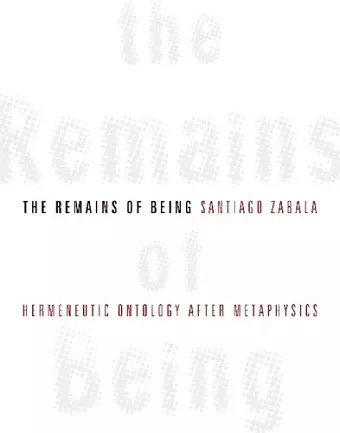The Remains of Being
Hermeneutic Ontology After Metaphysics
Format:Hardback
Publisher:Columbia University Press
Published:2nd Oct '09
Should be back in stock very soon

Santiago Zabala's The Remains of Being examines Heidegger's legacy through six post-Heideggerian thinkers, exploring the evolving nature of Being and its philosophical implications.
In The Remains of Being, Santiago Zabala explores the complex legacy of Heidegger's thoughts on Being, emphasizing its paradoxical nature. He argues that while Being may seem worn-out, it remains ever-present and available for philosophical inquiry. Zabala revisits the works of significant thinkers such as Jacques Derrida, Reiner Schurmann, and Gianni Vattimo to uncover the remnants of Being, suggesting that these remnants allow for a continuing ontological discourse. He posits that Being is not merely a static concept but an event that inspires wonder and curiosity in those who engage with it.
Zabala's analysis encourages a departure from rigid, essentialist frameworks, advocating instead for a more fluid understanding of Being. He highlights how postmetaphysical perspectives, influenced by figures like Nietzsche and Dewey, do not abandon the concept of Being; rather, they redefine its implications for philosophy. This shift in thinking opens new avenues for understanding the essence of existence, emphasizing a dynamic engagement with the question of Being itself.
Ultimately, The Remains of Being serves as a thought-provoking examination of how the remnants of Being can sustain philosophical inquiry. By tracing the thoughts of six post-Heideggerian thinkers, Zabala contributes to the ongoing dialogue about the nature of existence and the future of philosophical thought. His work is a testament to the enduring relevance of these questions, inviting readers to consider the implications for contemporary philosophy.
Zabala has given us a book which deserves wide reading and debate. -- David Jasper Literature & Theology An effective reminder of some of the most important developments twentieth-century continental philosophy. -- Richard Polt Parrhesia ...the book offers illuminating characterizations and suggestions. -- Andrew B. Irvine Religious Studies Review
ISBN: 9780231148306
Dimensions: unknown
Weight: unknown
178 pages